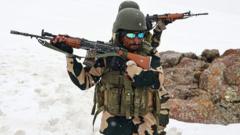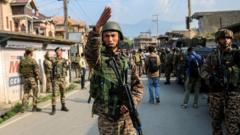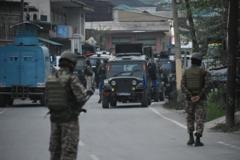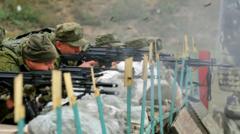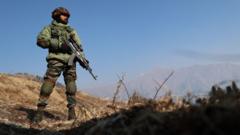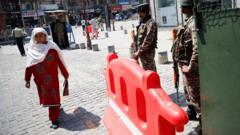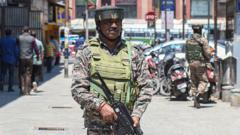As tensions flare between India and Pakistan over missile strikes and shelling in Kashmir, eyewitness accounts from civilians reveal the immense fear and devastation experienced on both sides of the border. Reports confirm multiple civilian casualties, raising concerns over the impact of military actions on innocent lives.
Civilian Toll Mounts in Kashmir Strikes Amid Rising Tensions
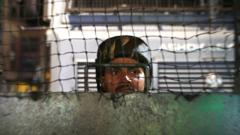
Civilian Toll Mounts in Kashmir Strikes Amid Rising Tensions
The recent cross-border strikes in Kashmir have left civilians in both Indian and Pakistani territories in fear, prompting urgent calls for peace amidst escalating violence.
In the early hours of Wednesday, chaos erupted as missile strikes in Kashmir shook homes and lives in both Indian and Pakistan-administered territories. Mohammed Waheed, a resident of Muzaffarabad, Pakistan-administered Kashmir, described how he awoke to a massive blast that sent his family and neighbors fleeing into the night. "Before we could even process what was happening, more missiles struck, causing widespread panic and chaos," he recounted. This violence was reportedly in retaliation for the death of 26 civilians in an earlier militant attack in Indian-administered Kashmir, which India attributed to Pakistan-based militant groups—an accusation Islamabad vehemently denies.
Witnesses across the Line of Control (LoC) reported harrowing tales of destruction and loss. Pakistani officials claimed that Indian strikes resulted in the deaths of eight civilians and injuries to 35 others. Meanwhile, on the Indian side, the military alleged that seven civilians were killed due to shelling from Pakistan. Among the casualties was Ruby Kaur from Poonch district, who was tragically killed while making tea for her ailing husband when a shell hit her home. Her uncle lamented the lack of community bunkers, leaving residents to shelter within their homes.
Dr. Zamrood Mughal, a local doctor from Poonch, expressed the widespread fear, saying residents spent the night in panic, unable to sleep. With reports of continuous explosions, families fled their homes in search of safety.
In Pakistan-administered Kashmir, Muhammad Younis Shah detailed how missiles struck an educational complex, obliterating a mosque and causing deep concern among residents. "We're terrified, and we don't know what to do," Waheed echoed, emphasizing a prevailing sense of dread about potential further escalations. Local sentiments reveal a desperate search for safety amid uncertainty.
Indian officials characterized their military action as "focused and non-escalatory," asserting that strikes targeted terrorist infrastructure based on credible intelligence. However, civilians on the ground are grappling with the reality that their places of worship and homes have been caught in the crossfire, leaving many bewildered as to why their towns have been targeted.
As calls for peace resonate amid rising tensions, the devastating impact on innocent civilians in both Indian and Pakistan-administered Kashmir raises urgent questions regarding the long-term repercussions of military confrontations in the region.



